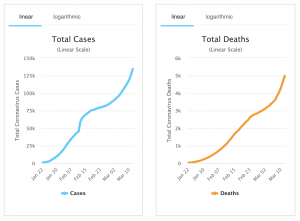Since we at Source work in both digital and print media, it’s good to have our fingers on the pulse and be aware of any changes in the industry, and we’ve had our eyes peeled on some changes in the landscape for a little while now.
The digital marketing sphere has boomed in recent years, and now most people turn to social media and online articles for their news. The so-called ‘death’ of print media has been long publicised, dramatised and catastrophised by people. And who can blame them? Print media is an industry that dates back to the 1800s, with the first movable printing type system dating back to 1450. It seems wrong that such a traditional form of communication be so quickly and easily phased out.
A U-Turn in the Industry?
However, despite the huge cultural shift from paper to screens, the industry might not be as doomed as first thought. When the first e-readers hit the markets back in the mid-2000s, people feared that it would cause the total dissolution of physical copies of books. It was marketed as revolutionary – there’s now no need to go to a shop to browse titles, with the text available to be downloaded at the press of a button, often for a fraction of the price of a physical copy.
But by 2015, eight years after the Kindle first hit the market, e-books occupied just twenty per cent of the total publishing sales. While this is a fair chunk, it is still vastly in the minority of sales, with millennials reportedly being the age group that is apparently keeping the industry afloat. That’s right – we aren’t ‘killing’ an industry for a change (!).
In 2018, sales of print books made $22.6 billion, while e-book copies generated $2.04 billion. While the joys and conveniences of the e-reader market have certainly been reaped, its impact hasn’t wiped out sales or enthusiasm for physical copies. It turns out that people simply love owning physical copies of the things they like to read.
Newsquest to Launch New Salford Publication
It seemed a clear trajectory for a long time, too, that digital media was going to clear print media clean off the shelves, but earlier this year the publisher Newsquest announced that the city of Salford will be getting a new newspaper, ‘Salford City News,’ launching at the end of this month. Newsquest says that the paper will ‘fly the flag for residents,’ and will have a cover price of 80p. The website will be found at salfordcitynews.co.uk.
Karl Holbrook, Newsquest Regional Group Editor for Lancashire and Greater Manchester, said, ‘Salford is an amazing place, full of history and culture. But there is a real sense on the ground hat Salford is often ignored next to its louder sibling across the River Irwell […] We believe there is a stainable publishing future in Salford as weekly print brand and as the daily online provider of the best local content.’
The company is also launching a Teesside edition. This will cover news in the north-east region, including Middlesbrough, Redcar, Stockton, Yarm and Saltburn. Hannah Chapman, editor of the Northern Echo, said: ‘This is such an exciting time for Teesside, with a series of major projects in the pipeline which could bring massive economic boosts to the area. I regularly get asked by readers for more Teesside content, so taking the two things together, it seemed like a natural step to increase our coverage with this new edition.’
If a resurgence of physical media is to occur, what better place to start than with local publishers? Local news is often side-lined and under-resourced in comparison to its larger counterparts. News of investment into the sector is extremely promising – not only for the residents of Salford and Teesside, but for all of those whose jobs rely on physical media.
A Matter of Time?
Despite this positive blip, it will be difficult to say what is on the horizon at this point in time for the future of traditional media. The chief executive of the New York Times, Mark Thompson, estimates that the paper has ‘at least ten years’ left in physical form, but ‘there may come a point when the economics of [the print paper] no longer make sense for us.’
Whatever the future holds for print media, we’ll be on the lookout for the changes to the industry and keep the updates coming!
At Source, we embrace both the traditional and the digital world, with effective PR and communications at the heart of what we do. Get in touch with us on 01829 7208789 to learn more, or follow us on Twitter (@source_tweets), Facebook (@SourcePublicRelations) and LinkedIn (The Source).


